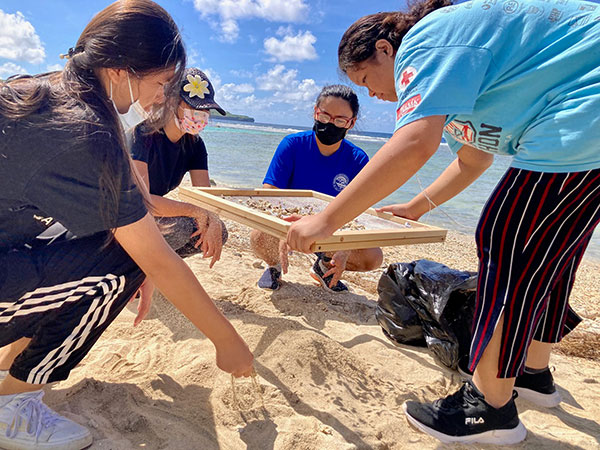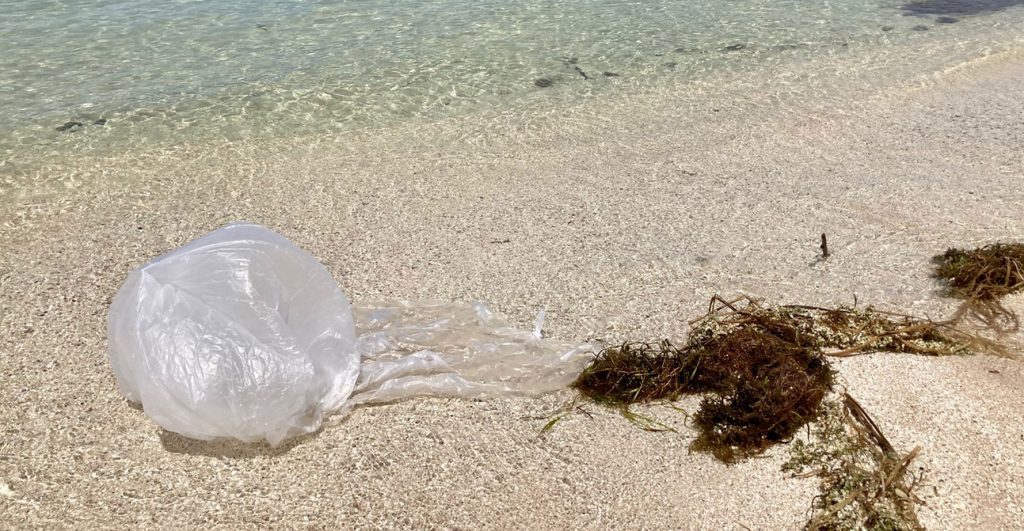$1 fee eyed to discourage use of single-use plastic bags

Saipan Southern High School students use sand sifters to check for microplastics at a beach cleanup at Laolao Bay in early June to celebrate the CNMI Ocean Month. Last year, on a single day during the International Coastal Cleanup, over 25,000 microplastics (plastic pieces less than 2.5cm) were collected on island. The Division of Coastal Resource Management reported that of all the tiny wastes collected by the ICC volunteers, 705 are tiny foam pieces, 906 are tiny glass pieces, and a whopping 26,509 are microplastics. (IVA MAURIN)
It takes a thousand years for a single plastic bag to degrade in a landfill. Yet most people don’t just use one plastic bag a day. A trillion plastic bags are estimated to be used worldwide every year. That is over a million bags per minute.
And most of these end up as trash, not only on land but in the ocean. The United Nations Environment Programme estimated in 2006 that about 46,000 of plastic are found floating in every square mile of ocean. That was 15 years ago. The trend has only worsened.
Worse, these bags do not really fully break down but photodegrades to become microplastics—plastic pieces smaller than 2.5cm that are washed up on shores, or are accidentally ingested by fish, which we then eat. Think about it.
To discourage the use of plastic bags in the CNMI, a $1 plastic bag fee is again being proposed at the Legislature through House Bill 22-56 (Eco-Friendly Act of 2021), which Rep. Sheila Babauta has introduced. This is an attempt to resuscitate the “Going Green Act” bill filed in 2015 by then representative and now Sen. Vinnie Sablan.
“Single-use plastics pose a serious threat to our environment. We want to discourage the use of single-use plastic bags and encourage our community to reuse bags—any bag,” Babauta said, adding that the bill aims to curb consumer behavior by implementing a $1 fee for single-use plastic bags. “According to research, a fee is just as effective as a ban, and provides for consumer flexibility. So shoppers will still be able to purchase single-use plastic bags, if the need arises; it will just cost $1.”
By enacting the legislation, the CNMI will be joining other Pacific nations, and fellow members in the Association of the Pacific Island Legislatures that adopted the 2008 resolution that supports efforts to decrease the consumption, and the economic and environmental impacts associated with the use of plastic checkout bags.
“We must demonstrate our commitment toward climate justice and caring for our environment and honor the movement with our brothers and sisters in the Pacific Islands,” Babauta said.
The bill also highlighted the duty to preserve the island’s resources for the benefit of all, and that issues associated with the impact of plastic bags must no longer be ignored.
‘Let’s talk about change’
According to the bill, the Legislature acknowledges that changes mandated “may be considered inconvenient and expensive, but the alternative of doing nothing, of standing idly by, will cost even more.”
The bill promotes behavioral change, where people, instead of having to pay a dollar per checkout plastic bag, could just use their own reusable bags (bags other than plastic) when going to the stores.
It does not include plastic bags used solely to contain fresh meat and meat products, including beef, pork, poultry, and seafood.
The bill also proposes that businesses, or the sellers, will have to provide a monthly report, and monthly deposit collected fees, to the Department of Finance stating the amount collected and actual cost incurred related to the plastic bag fee. The Department of Finance will forward the reports to the Department of Commerce, who will serve as the enforcement arm of this plastic bag fee.
Sellers who fail to assess the usage fee to customers will be fined $1,000 for the first violation, $1,500 for second violation, and $2,500 for any subsequent violations.
“Our beautiful natural resources are what contributes to our quality of life, economy, peace of mind, livelihood, and all things that matter. My hope is that we become aware of our consumption, our usage, and our impact on the environment. It is our responsibility to ensure we are good stewards of the environment, and set an example for the next generation,” Babauta said.
Acknowledging how hard changes can be, Babauta said that all she is asking is to open the door for discussions. “Change is scary. It is hard. I understand. All I ask is that we talk about it. Gather facts for your conversation. And think about the future of our Commonwealth.”
























